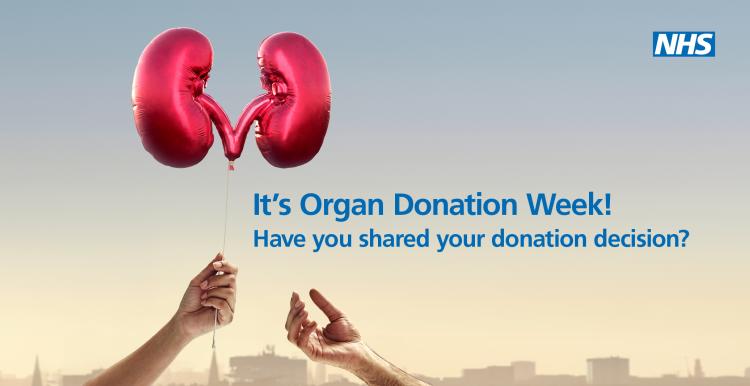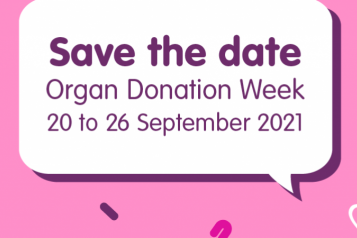Organ Donation Week

This Organ Donation Week, the NHS want everyone to know that the law around organ donation in England has changed to an opt out system.
About the opt out system
The opt out system works on the understanding that all adults agree to become organ donors when they die, unless they have made it known that they do not wish to donate.
If you have not recorded an organ donation decision and you are not in one of the excluded groups, it will be considered that you agree to donate your organs, when you die.
You may hear this system referred to as the opt out system, deemed consent, presumed consent or Max and Keira's Law.
You can still choose whether or not you want to be an organ donor when you die by registering your decision and telling your family. Your faith, beliefs and culture will continue to be respected.
Get the facts about organ donation to help you decide.
The opt out system applies to everyone in England, except for those who are part of what are called excluded groups.
Excluded groups are:
- Those under the age of 18
- People who lack the mental capacity to understand the new arrangements and take the necessary action
- Visitors to England, and those not living here voluntarily
- People who have lived in England for less than 12 months before their death
Register your decision
The NHS Organ Donor Register keeps a record of your organ donation decision. You can register to be an organ donor in the event of your death, or you can choose to opt out of donation.
FAQ
What is organ and tissue donation?
Organ and tissue donation is the act of giving your organs and/or tissues to help save or improve the lives of others when you die.
One organ donor can save or transform the lives of up to nine people. Tissue transplants can also significantly improve a person’s quality of life. This might be a cornea to help someone see again, a replacement heart valve to treat a heart defect, or skin to treat severe burns.
Why is the law around organ donation changing?
Every day, someone in the UK dies in need of an organ, because not enough organs are available for transplant. But only 1% of people die in circumstances that would allow them to donate.
Most people support organ donation in principle and would be willing to donate their organs after their death. However, many people do not make this decision clear either by signing on to the NHS Organ Donor Register or telling their family. The change in law better reflects what most people want to happen and will help save and improve more lives.
What do I have to do?
As the law around organ donation is changing in England from 20 May 2020, we want everybody to decide whether they want to be an organ donor and to share their decision with their family.
If you do want to be an organ donor, you can register to be a donor on the NHS Organ Donor Register.
If you do not want to be an organ donor, you can opt out by registering a ‘refuse to donate’ decision on the NHS Organ Donor Register.
If you have already registered your decision on the NHS Organ Donor Register and your decision remains the same, you should tell your family what you want.
If you have already registered, but want to change your recorded decision, you can do this simply at any time by completing the ‘amend your details’ form online.
What is the NHS Organ Donor Register?
The NHS Organ Donor Register is a secure database that holds the details of all those who have registered a decision about organ donation. It records whether or not someone wants to be an organ and tissue donor. For those who want to donate, it records which organs and tissues they want to donate. The Register can only be accessed by specialist NHS staff.
Recording your decision on the NHS Organ Donor Register and telling your family what you want are the best ways to help ensure your decision is honoured.
Will my family still be asked about donating my organs?
Yes. The family of a potential donor will always be approached to discuss the option of organ and tissue donation. This helps to make sure that any decision recorded on the NHS Organ Donor Register is your latest known decision. A specialist nurse will work with the family to help ensure this is supported.
Your family can tell us about any particular requests or requirements you may have had to help ensure that organ donation goes ahead in line with your faith or beliefs.
Your family provide important information about your medical, travel and social history too. The information your family provides would help ensure your organs are safe for others to receive.
